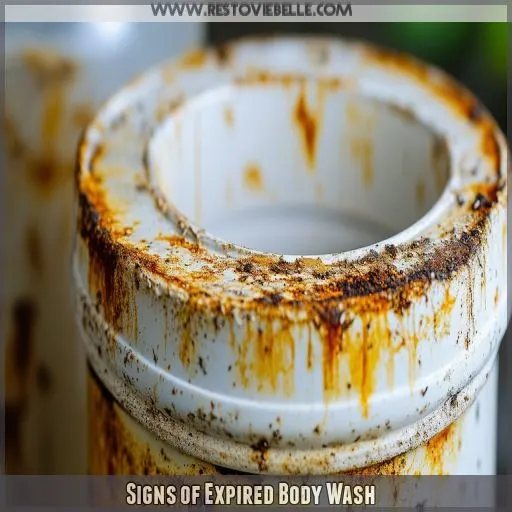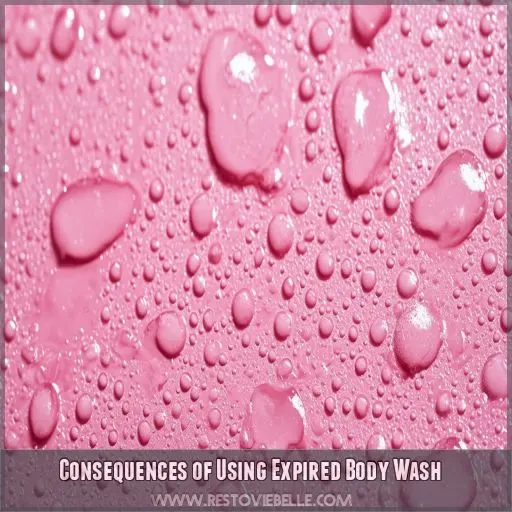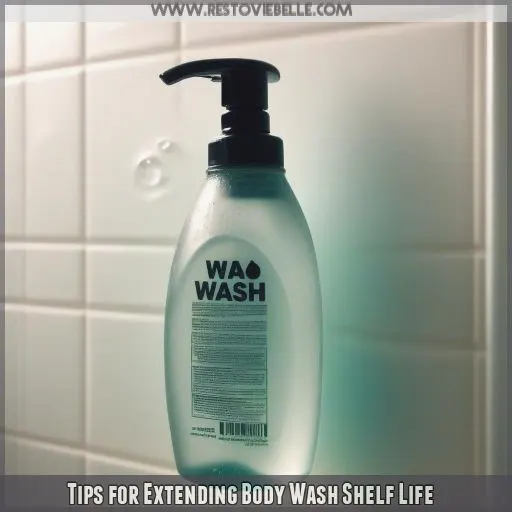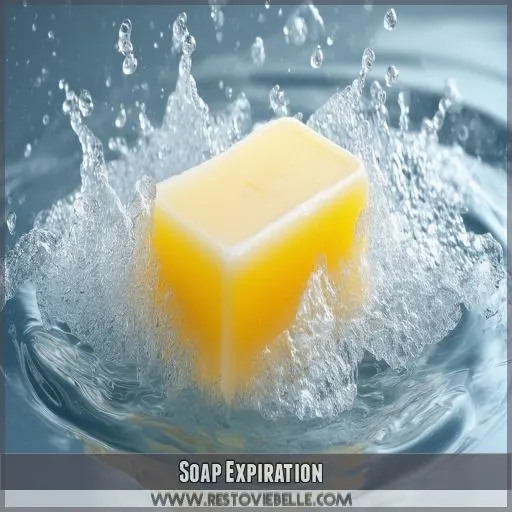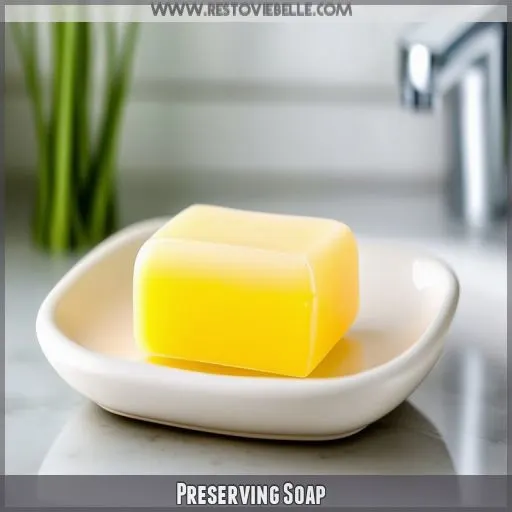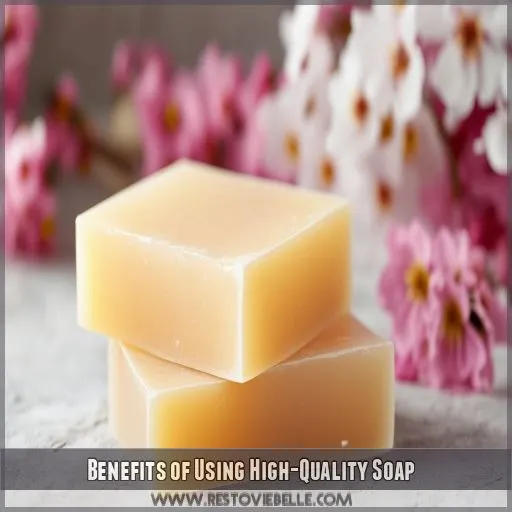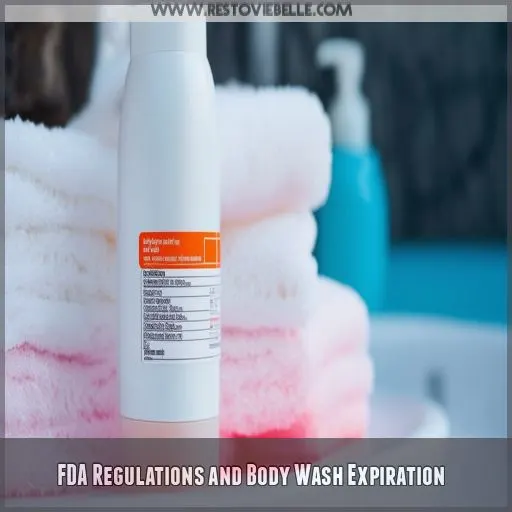This site is supported by our readers. We may earn a commission, at no cost to you, if you purchase through links.

Yes, body wash does expire too.
Ever wondered if body wash expired? You are not alone.
The ingredients determine how long body wash will last, whether opened or not, and the storage possibilities in between.
Keeping yourself safe and healthy means being aware of those signals: color change, odor, and texture.
Now, let’s dive right into the essentials that will help keep your hygiene products at their best.
Table Of Contents
- Key Takeaways
- Does Body Wash Expire?
- Signs of Expired Body Wash
- Consequences of Using Expired Body Wash
- Tips for Extending Body Wash Shelf Life
- Soap Expiration
- Preserving Soap
- Benefits of Using High-Quality Soap
- FDA Regulations and Body Wash Expiration
- Frequently Asked Questions (FAQs)
- Is it safe to use expired body wash?
- How do you know if body wash is bad?
- Is it OK to use expired liquid soap?
- How long does body wash usually last?
- Can expired body wash be recycled?
- Does using expired body wash alter its fragrance?
- Are body washes tested for shelf life stability?
- How are expiration dates determined for body washes?
- Can expired body wash still produce foam?
- Conclusion
Key Takeaways
- Your sudsy sidekick has a clock ticking away! Body wash doesn’t last forever, so keep an eye on the expiration date.
- Signs your wash is past its prime: Color changes, funky smells, and a lumpy texture are all red flags.
- Storage is key: Keep your body wash in a cool, dry place away from direct sunlight.
- Natural washes have a shorter shelf life: If your wash is all-natural, use it up sooner rather than later to avoid any unwanted surprises.
Does Body Wash Expire?
Body wash does have an expiration date, with unopened products typically lasting 2-3 years and opened products around 6-12 months. The shelf life of body wash can be affected by factors like storage conditions, packaging, and the presence of preservatives, so it’s important to pay attention to signs of expiration like changes in color, odor, or texture.
Shelf Life of Body Wash
Body wash does indeed have a shelf life., you can expect:
- Unopened body wash: Lasts about 2-3 years.
- Opened body wash: Lasts 6-12 months.
- Natural or organic body wash: Shorter shelf life of 6-9 months.
Pay attention to expiration dates and watch for signs of expired body wash like color or odor changes.
Unopened Vs. Opened
An unopened body wash lasts up to three years to its sealed environment. Once opened, it typically lasts about a year. The air, light, and humidity impact the natural shelf life, altering the soap’s ingredients. Oils might separate from water, disrupting the molecular structure. Proper storage is key to maintaining its efficacy.
Natural/Organic Vs. Regular
Natural body washes, unlike their synthetic counterparts, contain fewer preservatives, impacting their shelf life. Essential oils and natural extracts make them prone to quicker spoilage.
Here’s why they expire faster:
- Handmade formulations often lack stabilizers.
- Natural ingredients can harbor bacteria and germs.
- Without preservatives, they’re more likely to cause skin irritation and reactions.
Added Ingredients
Added ingredients can involve exfoliants, moisturizers, or antibacterial properties that will impact its shelf life. For example, natural soap with non-polar oils will last 6-9 months. Some commercial soaps are a bit longer. Handmade soaps tend to go rancid faster. Always check for signs like color and texture changes to ensure safety.
Factors Affecting Expiration
Expiration factors for body wash include storage conditions, to air and light, and the type of packaging. If body wash sits in a humid bathroom, it may expire faster. Plastic packaging can be more vulnerable to light exposure, impacting shelf life. Also, preservatives play a big role, with their presence generally extending the product’s usable period.
Storage Conditions
Effective storage of body wash is achieved when it’s stored in a cool and dry area. The location should be away from moisture and changes in temperature for maintaining consistency and shelf life.
Consequently, it will never find its way to constant steam or heat emanated through the shower. Proper storage ensures that it lathers well and keeps your hands free from irritants or issues resulting from expired body wash.
Exposure to Air and Light
Air and light exposure will significantly impact how long your washes last.
Exposure to air increases the rate of oxidation, which in turn degrades ingredients, changes color, and causes odor shifts.
Similar processes are hastened by light exposure—especially sunlight.
To keep this from happening, always store your body wash tightly closed and away from light in a cool, dark place.
Packaging Type
The type of packaging is very vital to the body wash’s shelf stability. Lightweight and convenient plastic bottles degrade rather faster. Glass bottles are relatively resistant to air and light but breakable.
Pump dispensers reduce contamination risk, while tube packaging mostly ensures the product remains airtight, which helps extend its life. Each one of these choices in packaging bears inherent pros and cons.
Presence of Preservatives
The presence of preservatives in body wash plays a role in extending its shelf life and ensuring hygiene. These substances help prevent growth, mold, and ingredient separation. However, some preservatives can have harmful effects on skin health.
- Parabens
- Formaldehyde releasers
- Isothiazolinones
- Benzyl alcohol
- Phenoxyethanol
Signs of Expired Body Wash
You can tell if body wash has expired by for changes in color, odor, and texture. Watch out for signs like mold or bacteria, and ingredient separation.
Color Change
You’ll first notice a change in the color of your body wash. The consistency becomes thicker or thinner, showing that the ingredients are separating. Sometimes it can become colored because some preservatives have broken down or because it has been exposed to so much light. Observe these visible signs to see that you’re using a fresh and effective product.
—
Odor Change
A change in scent is a clear sign your wash has expired. Spoiled ingredients can cause an unpleasant or unusual odor, posing potential allergy risks and hygiene concerns. Using such a product can affect your skin health, leading to irritation or other issues. Always pay attention to any significant odor changes to keep your skin safe.
Texture Change
Changes in texture are another clear sign of expired wash. If it becomes unusually thick or watery, this might indicate ingredients have separated. Plastic packaging and preservative efficacy also play roles. When your body wash feels off, it’s no longer reliable for cleaning. Discard it to avoid potential issues like skin irritation or ineffectiveness.
Mold or Bacteria Presence
If you notice any mold or bacterial growth in your body wash, it’s a clear sign that the product has expired. This contamination can pose serious health risks, from skin irritation to infections.
To avoid these issues, always store your body wash in a cool, dry place and discard any bottles that show signs of mold or bacteria. Natural body washes without preservatives are especially prone to this problem, so check expiration dates carefully.
Ingredient Separation
Another telltale sign of expired body wash is ingredient separation. If your body wash looks like an unappetizing science experiment with layers forming, it’s time to toss it. Natural ingredients are more prone to separating since they lack synthetic preservatives. Mind the shelf life and consider proper preservation methods, like storing in cool, dry places, to extend its usability.
Consequences of Using Expired Body Wash
Using expired body wash can cause skin irritation or rashes, making your skin feel uncomfortable and itchy. Additionally, it can lead to allergic reactions or even bacterial and fungal infections, posing serious health risks.
Skin Irritation or Rashes
Using an expired body wash can lead to skin irritation or rashes, as the product may harbor harmful bacteria or fungi. These microbial contaminants can cause contact dermatitis, inflammation, and even bacterial or fungal skin infections. Discontinue use immediately if you experience any skin reactions and consult a dermatologist if symptoms persist.
Allergic Reactions
Expired body wash can also trigger allergic reactions. degraded ingredients may alter, causing unexpected skin irritation. You might experience redness, itching, or hives due to these allergic reaction triggers. To prevent such issues, always check expiration dates and, if the body wash smells off or has changed color, discard it promptly to avoid potential complications.
Bacterial or Fungal Infections
Expired body wash can harbor bacteria and fungi, to skin irritation, rashes, or worse—bacterial and fungal infections. These germs thrive in the altered chemical environment of expired products, making you more susceptible to allergic reactions and itchy, uncomfortable skin. So, heed the signs: a smelly, separating body wash means it’s time to toss it.
Tips for Extending Body Wash Shelf Life
To extend the shelf life of your body wash, be sure to store it in a cool, dry place away from direct sunlight and heat. Additionally, keep the container tightly closed and use a clean washcloth or loofah to avoid introducing contaminants that could cause the product to expire prematurely.
Proper Storage
Keep your body wash out of direct sunlight and store it away from heat to help it last a long time. It stores well because proper storage keeps it free from mold attack and protects its expiry dates.
Use the kind of packaging material that shields contents from air and light.
With the little help on how to keep your body wash ingredient efficient, you end up increasing the shelf life.
Container Closure
Keep body washes by keeping their container closed. Closing containers effectively minimizes air exposure, hence improving shelf life. Consider:
- Container size: Smaller bottles reduce air exposure.
- Cap design: Flip-tops and screw lids are designed for a tight seal.
- Pump durability: Compliant, high-quality pumps allow minimal air entry.
- Nozzle shape: Snug nozzles prevent leakage of the product.
Sunlight and Heat Exposure
Avoid exposing your body wash to direct sunlight or heat. Sunlight and high temperatures can degrade the ingredients, causing the product to lose its effectiveness and potentially become unsafe. Store your body wash in a cool, dry place away from any heat sources or bright light to maximize its shelf life.
Using Clean Washcloth or Loofah
To further extend your body wash’s shelf life using a clean washcloth or loofah is key. Poor hygiene practices with these items can introduce bacteria, compromising your body wash. Always:
- Rinse thoroughly after each use to remove soap residue.
- Hang them to dry to avoid damp environments.
- Replace regularly to maintain hygiene.
Prompt Disposal of Expired Body Wash
Promptly dispose of expired body wash to avoid irritation, rashes, and infections caused by bacteria or mold. Always check for signs of expiration—color change, odor, texture issues, or ingredient separation. Using expired body wash can harm your skin’s health, so err on the side of caution.
| Signs of Expiry | Potential Risks | Proactive Measures |
|---|---|---|
| Color change | Skin irritation | Check regularly |
| Odor change | Allergic reactions | Store properly |
| Ingredient separation | Bacterial infections | Dispose of promptly |
Soap Expiration
Much like body wash, soap can expire based on the shelf life of its ingredients. Proper storage and handling techniques will help extend the life of your soap products and ensure a pleasant bathing experience.
Shelf Life Determinants
Expiration dates, natural ingredients, and those added by the manufacturer establish a soap’s lifetime. The natural components may have a shorter life.
There are storage conditions of maximum importance: far away from heat, humidity, and sunlight. Proper storage is remarkable for extending the period significantly for efficiency and safety. Always check a product’s packaging for expiration information, especially with products containing natural or specialized ingredients.
Ingredient Shelf Life
The shelf life of body wash depends on the ingredients. Natural body wash, free from synthetic preservatives, often has a shorter self-life because of natural ingredients. Additional incidences with essential oils or exfoliants reduce their longevity further. These ideal storage conditions are in a cool, dry place, as this slows degradation. Maintaining ingredient integrity ensures effectiveness and safety.
Preservatives
Preservatives offer the most important value of extending the shelf life of soaps by acting against proliferation and ensuring effectiveness over time in the soap. However, cases of preservatives sensitivity or allergies can be an occurrence. Keep the soaps away from heat and moisture to get the maximum storage life, and follow any special storage instructions of the manufacturer.
- Preservatives enhance the shelf life of soaps by virtue of the inhibition of microbial growth.
- Preservatives maintain the cleaning power of soaps and prevent deterioration.
- Some preservatives are better avoided by individuals who react sensitively to them.
- Appropriate storage plays a great role in the freshness of soaps.
Packaging Information
Packaging impacts how long soaps will last on the shelf. Plastic, in general, protects liquid soap better than glass, which is better protection against air.
Protective wraps on bar soaps help in the preservation of moisture and fragrance. Follow special care instructions on the packaging.
For example, storing in a cool dry place will extend the shelf life of the soap, and always keep it tightly closed to prevent contamination.
Signs of Expired Soap
Wondering your soap has gone bad? Look for these telltale signs:
- Discoloration: Soap may show orange spots.
- Mold: Visible mold formation is a clear indicator.
- Texture: A change in consistency signals spoilage.
- Odor: A rancid, off-putting smell suggests it’s past its prime.
Bar Soap
Bar soap can expire due to its natural ingredients having shorter shelf lives than synthetic ones. Look for orange spots, mold, reduced lather, or a rancid scent – these are signs your bar soap has gone bad. Store bar soap in a ventilated dish to extend its shelf life, especially for handmade soaps with fewer preservatives.
Liquid Soap
When using liquid soap, always remember proper storage to extend its shelf life. Here are four tips:
- Keep it in a cool, dry place, away from direct sunlight.
- Close the cap tightly after each use.
- Use travel-sized bottles for convenience.
- Choose soap dispensers with antibacterial properties to reduce contamination.
Maintain these habits for a fresher, longer-lasting product!
Risks of Using Expired Soap
Such expired soap can cause skin irritation, rashes, and allergic reactions. It’s best to get rid of it if you’ve come across decreased lather or a foul smell. Expired soap has mold or bacteria responsible for infection. Hence, one should identify these symptoms so as to avoid such negative effects on our skin system. Always check for expired soap symptoms.
Preserving Soap
To preserve your soap, store bar soap in ventilated dish and keep liquid soap caps tightly closed. Hang infused sponges to dry after use to prevent mold and bacteria buildup.
Storage Tips for Bar Soap
Keep the soap bar in a well-ventilated soap dish. This will prevent the settling of moisture and hence reduce the growth of mold, therefore increasing its lifetime.
Pack the bar soap with some breathable cloth while traveling to protect it.
For liquid soaps, ensure the cap of the dispenser is always tightly closed to keep off air and other contaminants from entering so as to keep the product in its integrity.
Proper Handling of Liquid Soap
In the case of liquid soap, seal the cap tightly after use to avoid exposure to air. Out of direct sunlight, keep the bottle in a cool, dry place.
The right design of a soap dish will further contribute to the prolonged shelf life of natural antibacterial soap bars.
Take note of the instructions provided by the manufacturer on how to store and use such products effectively.
Infused Sponges Maintenance
Infused sponges need proper care to stayic. Make sure to hang your sponge in a dry place after use, this helps with sponge drying and mold prevention. Regularly clean your sponge to avoid bacteria growth, and consider using natural preservatives to maintain freshness. This simple routine effectively prevents mold, keeps your sponge clean, and extends its life.
Benefits of Using High-Quality Soap
Using high-quality soap provides nourishing ingredients that support skin health and offer bacteria-resistant properties for better hygiene. Additionally, these soaps promote a more enjoyable bathing experience and can be eco-friendly, benefiting both you and the environment.
Nourishing Ingredients
High-quality soaps with nourishing ingredients may immensely improve one’s skin. Usually, these are soaps that exhibit a number of health benefits, such as:
- Vegan friendly formulations.
- Paraben-free, thus it doesn’t contain harmful preservatives.
- Cruelty-free, not tested on animals.
Eco-friendly packaging and ingredients.
Choosing such soaps ensures your bathing experience is both pleasant and beneficial to your well-being.
Hygiene Properties
High-quality soaps often contain beneficial antimicrobial properties, helping to keep your skin clean and healthy. Look for fragrance-free options if you have sensitivities, and consider vegan formulas for a gentler clean. These eco-friendly choices can provide a superior bathing experience without irritating even the most sensitive skin.
Personal and Environmental Benefits
Quality soaps come with several added advantages. Eco options lessen your impact on the environment, while vegan-friendly soaps, paraben-free products, and cruelty-free options make sure ethical living extends into hygiene practices.
Most of these soaps do have nourishing ingredients that help in skin health, elevating their use during your everyday self-care routine. In addition to that, they raise the bathing experience to a higher level by making showers refreshing, guilt-free, and indulgent.
FDA Regulations and Body Wash Expiration
When purchasing body wash, look for FDA-certified products that display a Period After Opening (PAO) label indicating the product’s shelf life. If the body wash isn’t FDA-approved, use your best judgment to determine if it’s still safe to use based on the appearance and scent.
FDA-Certified Products
When considering body wash, look for FDA-certified. These come with expiration dates, ensuring ingredient regulation and product safety. FDA’s rigorous standards mean your body wash is reliable and less likely to cause irritation or infections. Always check for certification to benefit from these safeguards, and maintain your skin’s health by trusting verified products.
Period After Opening (PAO) Labels
PA labels are particularly useful regarding the expiration of body wash. Mostly found at the bottom or cap area of the packaging, PA labels on body wash define the time range in which it will be safe once opened. You’ll usually find an image of a jar with a number indicating, for example, "12M" for twelve months.
This awareness will help keep your skin healthy.
Safety Considerations for Non-FDA Approved Products
Additional care should be exercised with products that aren’t FDA approved. In the absence of clear ‘expiration dates‘, there’s an element of uncertainty about expiration. Homemade body wash, for example, has a rather short lifetime in the absence of preservatives for its composition.
If in doubt, one can always opt for alternative cleaning methods with a clean conscience. One has to be really careful with products not up to the benchmark laid down by FDA regulations on safety aspects.
Frequently Asked Questions (FAQs)
Is it safe to use expired body wash?
Using expired body wash isn’t safe. It may harbor bacteria or mold, altering its effectiveness and potentially causing skin irritation, rashes, or infections. Always check for signs of expiration and discard if expired.
How do you know if body wash is bad?
Your body wash has probably turned into a science if it’s changed color, smells odd, separated, or grown mold. Check these telltale signs so you don’t risk skin irritation or infections.
Is it OK to use expired liquid soap?
It’s best not to use expired liquid soap Over time, it can develop bacteria, mold, or lose its effectiveness, potentially causing skin irritation or infections. Always check for expiration signs before use.
How long does body wash usually last?
A body wash would be alright for as long as three years unopened and one year after opening. Be on the lookout for off smells, colors, and thick or thin consistencies—better safe than sorry when it comes to skin health.
Can expired body wash be recycled?
Unfortunately, expired body wash can’t be recycled. The ingredients break down over time, making it unsafe to use or recycle. It’s best to discard expired body wash properly to avoid skin irritation or other health risks.
Does using expired body wash alter its fragrance?
Using expired body wash can definitely alter its fragrance You might notice an off-putting smell due to ingredient degradation. This change signals that the body wash is no longer effective or safe for use.
Are body washes tested for shelf life stability?
Expiration of body wash is no mystery. Manufacturers vigorously test their formula to ensure a long period of freshness. Your suds won’t let you down if you just take heed of the expiration date listed on the label.
How are expiration dates determined for body washes?
Expiration dates of body washes are determined based on stability studies that consider ingredient integrity, microbial growth, packaging interactions, and environmental conditions to guarantee the safety and efficacy of the product throughout its intended shelf life.
Can expired body wash still produce foam?
Yes, expired body wash can still produce foam but its effectiveness might be reduced, and it may cause skin irritation or infections. Always check for signs of expiration like odor changes, discoloration, or mold.
Conclusion
Consider your body wash to be a ticking time bomb, which, if ignored, will erupt into unexpected problems.
Well, yes, body wash does expire, and knowing when is everything. Be observant of color variation, smell, and texture.
Storage conditions can extend it and reduce the risk of skin irritation or infection. Be informed on shelf life and heed expiration indicators so that you’re assured your hygiene products are still effective and safe for use.

